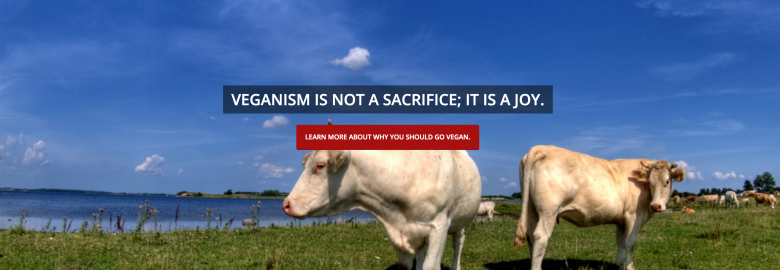The Abolitionist Approach
... and abolitionism means Veganism
Animal Rights Organization
Mission Statement
The mission of this website is to provide a clear statement of an approach to animal rights that (1) requires the abolition of animal exploitation and rejects the regulation of animal exploitation; (2) is based only on animal sentience and no other cognitive characteristic, (3) regards veganism as the moral baseline of the animal rights position; and (4) rejects all violence and promotes activism in the form of creative, non-violent vegan education.
1. Animal Rights as Abolition
There is a great deal of confusion about the meaning of “animal rights.” For some, any regulatory measure concerning nonhumans, such as increasing the size of battery cages for hens or a law requiring the “humane” treatment of nonhumans, involves “animal rights.” For others, “animal rights” means that nonhumans ought to have all the same rights as humans have. And some argue that certain animals, such as the nonhuman great apes, matter more than other nonhumans because the great apes have humanlike cognitive characteristics.
There is also a general failure on the part of the contemporary animal-advocacy movement to recognize veganism as the baseline of the animal rights movement.
This site seeks to bring clarity and simplicity to the concept of animal rights. In order to understand the human/nonhuman relationship, we must distinguish between our use of animals and our treatment of animals. These aspects are different because whether we use animals at all for a particular purpose is a different question from how we treat them. For example, whether it is morally acceptable to eat animals at all is a different question from how we treat those animals and whether, for instance, we raise them in intensive “factory-farms” or in “free-range” conditions. Our use of animals is a separate matter from whether our treatment of them is “humane” or “cruel.”
Animal welfare concerns the treatment of animals and has as its central focus the regulation of animal exploitation. Animal welfare maintains that it is acceptable to use nonhumans as long as we treat them “humanely.”
Animal rights theory, as it is presented on this site, concerns the use of animals and has as its central focus the abolition of animal use rather than its regulation. We have no moral justification for using nonhumans for our purposes. Moreover, as long as animals are human property, animal welfare standards will never provide adequate protection to animal interests.
A shorthand way of describing the view presented here is to say that all sentient beings should have at least one right—the right not to be treated as property. If we recognized this one right, we would be compelled to abolish institutionalized animal exploitation. We would stop bringing domesticated nonhumans into existence for human use.
2. The Importance of Sentience
The approach that is described in this site requires only that nonhumans be sentient—that they have subjective awareness—in order to have the right not to be treated as resources. That is, it is not necessary that nonhumans have humanlike rationality or other humanlike cognitive characteristics to be members of the moral community. This approach rejects the view, proposed by some animal advocates, that nonhuman great apes or other nonhumans matter more than other nonhumans, or are entitled to greater moral or legal protection because of their humanlike characteristics.
3. Veganism as Abolition
Many animal advocates take the position that veganism is not required as a baseline principle of the animal rights movement. Some advocates do not even view vegetarianism as required, claiming that we can be “conscientious omnivores” if we eat animal flesh and animal products that have been produced in a supposedly more “humane” way.
This site also seeks to make clear that the moral baseline of an animal rights movement is veganism. Veganism is not merely a matter of diet; it is a moral and political commitment to abolition on the individual level and extends not only to matters of food, but to clothing and other products, and to other personal actions and choices. It is important to recognize that just as an abolitionist with respect to human slavery cannot continue to be a slaveowner, an abolitionist with respect to animal slavery cannot continue to consume or use animal flesh or animal products.
4. Abolition as Non-Violence
The animal rights position is the ultimate rejection of violence. It is the ultimate affirmation of peace. The animal rights movement is the logical progression of the peace movement, which seeks to end conflict between humans; the animal rights movement ideally seeks to take that a step further and to end conflict between humans and nonhumans.
Violence treats others as means to ends rather than as ends in themselves. When we engage in violence against others—whether they are human or nonhuman—we ignore their inherent value. We treat them only as things that have no value except that which we decide to give them. This is what leads people to engage in crimes of violence against people of color, women, and gays and lesbians. It is what leads us to commodify nonhumans and treat them as resources that exist solely for our use. All of it is wrong and should be rejected.
Moreover, for those who advocate violence, exactly against whom is this violence to be directed? The farmer raises animals because the overwhelming number of humans demand to meat and animal products. The farmer raises those animals in intensive conditions because consumers want meat and animal products to be as inexpensive as possible.
Violence against institutional providers of animal products makes no sense. If we want to end animal exploitation, we need to educate the public about why animal exploitation is immoral. We need to get people to understand that animals are not things for our consumption and that can be done only through education—not violence.
The abolitionist approach to animal rights maintains that those who reject the exploitation of nonhuman animals should be ethical vegans and should engage in creative, non-violent vegan education.
It is, however, important to understand that taking a non-violent approach does not mean taking a passive position. On the contrary. Creative, non-violent vegan education is anything but passive. It is active opposition to all forms of animal exploitation. And as the abolitionist approach recognizes the connection between human and nonhuman exploitation, it advocates the active refusal to participate in the exploitation of humans as well and maintains that all forms of discrimination—racism, sexism, heterosexism, ageism, ableism, etcetera—represent violence and should, like speciesism, be rejected.
- Veganism is not merely a matter of diet or lifestyle. Veganism is your personal expression of your endorsement of the abolitionist approach.
- Veganism means that you do not eat any animal products—no meat, fish, chicken or other birds, dairy, eggs, or honey. It means that you do not wear fur, leather, wool, or silk, and that you do not use products that contain animal by-products.
- Every person who goes vegan results in a decrease in demand for animal products.
- Veganism is something that each of us can do now. No campaign, legislation, litigation, is required. You can just do it. It is completely within your control.
- And it is easy. It’s just a matter of really taking nonhuman animals seriously and not just saying that you take them seriously. It’s just a matter of recognizing that whatever pleasure you get from a steak or ice cream cone, or wearing a leather coat, it cannot possibly justify inflicting pain, suffering, and death on an animal.
- Giving up flesh is not enough. There is no moral distinction that can be drawn between meat on one hand, and dairy, eggs, or other animal foods on the other. Animals used for dairy and eggs are treated horribly and end up in the same slaughterhouse as meat animals.
- There is probably more suffering in a glass of milk than in a steak.
- “Free-range” or “humanely raised” animals or animal products are not the answer. Those labels may make you feel better, but they don’t do anything for the nonhumans you’re exploiting.
- Just as you could not consistently have been an abolitionist with respect to human slaves if you owned slaves, you cannot consistently be an abolitionist with respect to nonhuman slavery if you continue to eat, wear, or use the flesh and products derived from nonhuman animals.
And after you go vegan, start educating everyone you know in creative, non-violent ways about veganism and explaining to them the ideas that motivated you.
- You don’t need money, or a large animal organization, or anything—but your own decision—to help achieve abolition.


